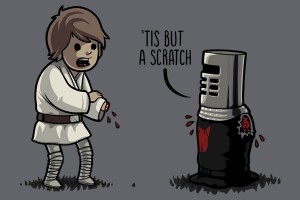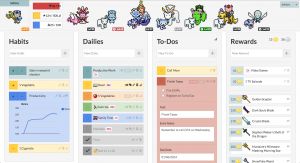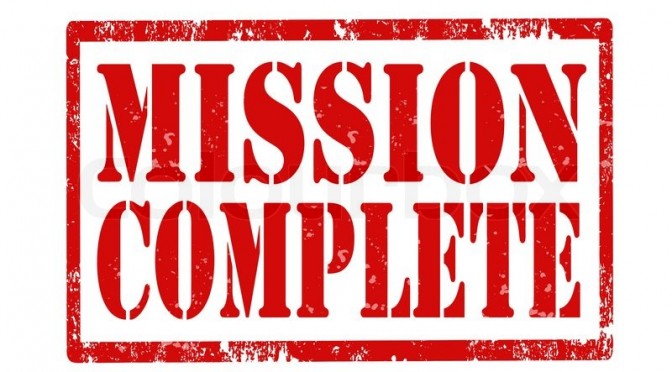Finishing things – it’s kind of a pain in the ass and most of us have a hard time sealing the deal. Sure, sometimes, we get motivated and we make a lot of progress in the right direction. But finishing things? That’s harder than we like to admit more often than not. Follow-through is both a challenge and burden and no one really wants any part of those if they have the option out. Ironically, when it happens, we’re generally harder on ourselves than others. So today I find myself looking at last month’s (as of this writing) NaNoWriMo and thinking “I wonder how many people hit 50k and need to do more.”
The answer is that it really depends on what people were hoping to get out of it. Most people don’t really go into NaNo with the intention of actually being an author. They go in with the intention of proving they can do something of that scale but have no aspirations for greater. Others, as I’ve pointed out in the past, have far different goals in mind. Everyone’s come to the task with a different endgame. If you were just aiming to hit 50k and don’t have much care for a follow through, then congrats on hitting the goal and hope you give it another go next time. On the other hand, if you’re one of those people who were using that event as a starting point, I know from experience that the months after NaNo can be harder than the challenge itself.
Honestly, being a writer itself – especially a beginning writer – is harder than the NaNoWriMo challenge. If it were the leisurely task that people think it is from time to time, it wouldn’t require a month dedicated to it. After all, who needs a challenge to do something you work on all the time? If it were something easy, there wouldn’t be a need. Even the writers I know look at the challenge as something of an excuse to get motivated again. So… the question that’s been posed to me once is, “how do you keep going?”
And, besides being stubborn (and even angry at times), the answer is…
Manage Your Discomfort

Mark Twain once said that the key to success was to make your vocation your vacation. It’s true, the more you enjoy the work you do the more likely you are to be great at it. No one is really ever good at something they don’t at least take pride in, let alone being great at it. But we must also admit that eventually, no matter how hard you try, something will start to become work rather than a hobby. It’s when the work crosses from hobby to work that a lot of us often struggle and that usually happens when we have to take it seriously.
Everyone likes to be creative, it’s part of our genetic makeup, who we are as a species. We want to build something, make something, be productive. Maybe not all of us do it in the same way, but it’s in there deep down. However, we also want to be comfortable and we become uncomfortable when we don’t feel a point behind what we’re doing. That’s one of the big problems with writing when you take it seriously. Once it starts becoming “serious” then it needs to feel like it has a point and it’s incredibly easy to become discouraged. If you’re not taking it seriously, if it’s just a hobby, then the point is simply to entertain you. But if you’re serious about it… you need to feel like it’s going somewhere.
That’s incredibly hard to hold onto.
So the ability to keep going depends largely on making yourself comfortable when it stops being for laughs. You should still enjoy the work so long as you’re not stressed out. The question is: how do we reduce the stress so that you can keep going and finish the task?
Set More Reasonable Goals

First? Ditch silly notions like doing 50,000 words in a single month. The truth is that it’s actually a pretty unreasonable goal. Sure, it’s physically possible and it’s even mentally possible. Some people even do it without even trying. But when you start to really take the whole thing seriously it can become difficult to churn that out consistently while also controlling for quality. Pushing yourself to finish a 100,000 word novel in two months, for instance, is a silly concept to begin with.
About now, some of you may think, “but the professionals do it, right?” The thing is that a lot of professionals out there actually don’t. It’s not unheard of for a professional to write something to the tune of 6,000 word in a week. The likes of George RR Martin may even do less. And while Stephen King says you should write 2,000 words a day – that’s also the only thing he’s doing most of the time. Let’s face it, the guy hasn’t had to stop writing very often for a very long time.
In fact, as NaNoWriMo comes to a close every year I’ve noticed that there are a lot of professional and semi-professional writers who hold TGIO (Thank God It’s Over) seminars, webinars, and personal celebrations. They know it’s a grind and, if they take part, they feel it’s a grind themselves. It’s a month of essentially writing without ever stopping to look back or taking a moment to think about where you’re going next. That’s not something that’s really good for you or your work in the long run.
So, want to finish? Try setting a goal that’s more attainable without pushing yourself too hard. At 25,000 words a month, for instance, you could do a thousand words a day and still have 3 to 5 days off. This is the kind of pace that would allow you to write something you’re proud of while still being productive. Consider that, at a thousand words a day, even George RR Martin could have completed one of his novels in about a year (rather than the 2~6 it takes him normally). Given that his books are relatively big, that’s an impressive pace and only half the speed of the challenges we give ourselves.
Don’t Aim To Finish, Aim To Keep Working

Second, the most important part of being productive is to focus on the task at hand rather than how much of it is still ahead of you. It’s easy to get lost in just how much of the job isn’t done yet, especially when you happen to look at the prospect of editing, rewriting, and repeating the process with new drafts. Seen that way, the prospect can be intimidating.
So a key to finishing is to not worry about how far away you are from finishing it. Set your daily goals for yourself and then focus on completing those goals. A thousand words a day is a relatively manageable task that you can get through without too much anxiety. A chapter a week is even acceptable. But don’t worry about how much is left to be done. You’ll finish when you finish and setting an overall deadline is only a big thing once you’ve got some real incentives.

Those daily goals are the really important part. Every time you sit down to work on a small part of the bigger picture, you’re working towards completing the whole of it. Brick by brick, you can build just about anything with patience and dedication. Maybe it doesn’t get done as fast as you would have wanted it, but it will get done. Sometimes the speed we wanted isn’t the speed that was going to work anyway.
One of the biggest obstacles of finishing, after all, is psyching yourself out of doing it at all.
Ensure Your Breaks Are Temporary

Which, of course, leads us to the common problem of putting down the project and never picking it back up again. This tends to happen right around that time you start to consider how much has to be done. It’s in the human nature to procrastinate as much as possible and the bigger the task at hand the longer we’re going to put off doing it. After all, you need to have enough time to write that thousand words a day, but you’ll eventually skip a day and tell yourself 2,000 the next day. But then you don’t do it because you can’t find time to do 2,000 words so you end up having to write 3.

It’s going to happen, you’re going to put it down for at least a day and then, if you’re struggling, start to put it off for even longer. It’s not even your intention when it happens – it just does. Few people who get that worked up about the project in the first place ever mean to put it on the shelf for too long.
So make sure those breaks aren’t going to last that long. Give yourself some wiggle room where you’re allowed to not complete the goal one day but will get back on it the next. Don’t stack up the obligation (an old trap a lot of you are familiar with), just declare that it’s okay to miss that day and it’s okay to let a thousand word goal slip once in a while. In fact, I recommend that everyone gives themselves at least a day off every 5 to 6 thousand words to make sure that you don’t become more inclined to want to skip those days in between. A break here or there is not only granted, it’s needed.
This may bring out feelings of guilt or shame in some people (I speak from experience, my friends can attest that I am brutally unkind to myself on sick days), but it’s something we need to grant ourselves. JK Rowling is supposed to be a master of minesweeper from the times she played it in between the things she was working on. Think about taht and realize that she wrote 7 books in a relatively short time. The woman was mad productive and yet she came out of it with a talent at minesweeper – it’s okay to breathe!
Find Ways To Gamify It Yourself

And finally, one of the ways to make all of this work is to find a way to make each little victory worthwhile. Give yourself a treat for hitting certain goals, make things you want to do for fun a reward for completing a task, take a drink every 500 words!

The point is to make sure you celebrate the small victories so that you can keep wanting to make them. It’s a bit like an RPG where a victory song plays at the end of every battle. In the long run, those random encounters or boss battles aren’t necessarily the end of the game, but you still feel like a winner for having done it. Even the smallest of victories in those games can feel like a massive win in the long run because, “hell yeah, listen to that tune!” It’s a tiny little reward that makes the time you spent on it all worth it.

In fact, one method that I’ve found to help me keep productive came out of a friend who pushed me towards a lifestyle RPG called Habitica. In that place you can get experience points and loot for every little task you complete in the day. Do your laundry? Points! Do your writing goals? Victory! Walk up the stairs? Leveling up!

It makes everything you do feel like progress without it having to all exist in self motivation. It turns the act of being productive into a game and that’s the kind of mentality you need. Because for every word you write, you’re closer to a sentence, every sentence leads to a paragraph, and every paragraph leads towards a chapter. And you do enough of those…
You’ll be done before you know it.
(I write novels. I’m currently working on a third. But in the meantime you can find me here at this blog or on my twitter account where I may occasionally have to remind myself to take a breath.)







